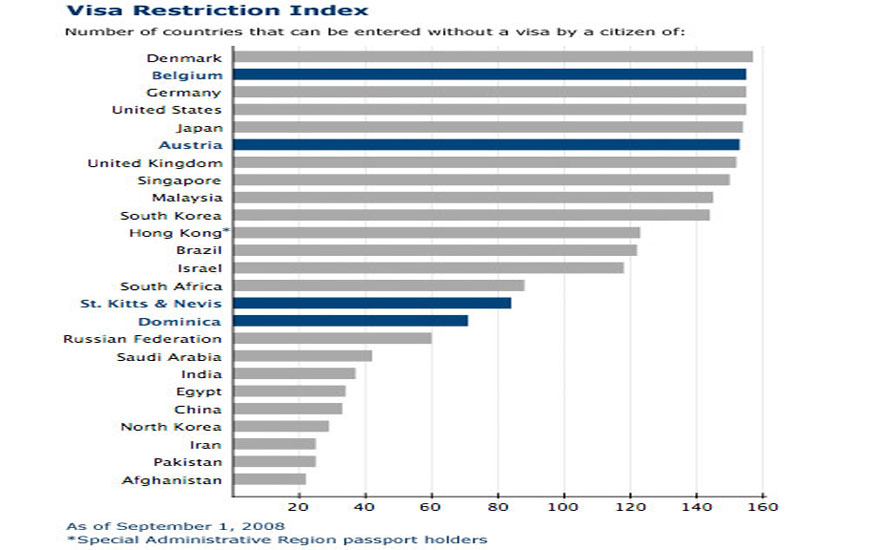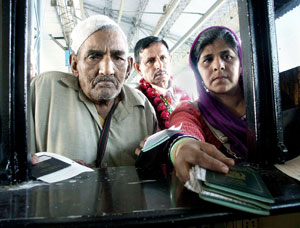I’m a Pakistani, Get Me Out of Here
By Faiza Shah | News & Politics | Published 16 years ago
Come summer, friends, family and acquaintances are all zipping up their suitcases to spend their holidays abroad — whether it’s visiting family in Canada, or touring the States with their kids or going on their long-planned vacation to Europe. All the lucky ones, that is. Most of us will have a dozen stories about people whose vacations were miserably rained upon due to that dreaded stamp on the good old green passport: “Entry rejected.”
Even in today’s globalised world, visa restrictions play an important role in controlling the movement of foreign nationals across borders. Almost all countries now require visas from certain non-nationals who wish to enter their territory.
Partners in international residence and citizenship planning, Henley & Partners created the Henley Visa Restrictions Index which ranks countries according to the visa-free access its citizens enjoy to other countries. Not only does this index show a global ranking of citizens of 89 countries in terms of the international travel freedom they enjoy, it also reflects the international relations and status of individual countries with respect to others.
As of September 2008, the Danes, Finns and Americans apparently have it the easiest, according to this list, enjoying visa-free travel to over 150 different countries.

The Visa Restriction Index by Henley & Partners. Source: www.henleyglobal.com
And how do we rank?
No surprise that Pakistan sits at the foot of the index, with our brothers-in-arms, Afghanistan, Iran and Iraq.
The green passport has prompted numerous sob stories in the last decade. Pakistanis are by and large singled out; in fact, victimised for being green passport-holders. They have to put up with humiliation at immigration at airports, inch through the long meandering queues at embassies for interviews, and wait out the indeterminate visa-processing times. The websites and embassies will breezily inform applicants that the stipulated time for processing visas is one to six weeks. Even then it’s a surprise when we have our visas in our hands within the stipulated time.
Of course the western embassies all claim that their visa restrictions apply not only to Pakistan but all over the world. Sadly, there’s one region of tension these days on the news and, unfortunately, we are all stigmatised through association with a common creed, and belonging to a common region.
Travelling within the country is considered unsafe due to the rampant terrorism, and the progressively rising cost of visa fees, the inevitable delays in the processing and the extra travel expenditure to appear for interviews at the embassies located outside your resident city make travel abroad a little less than easy and speedy.
Arabic names included on the blacklist of probable terrorists are immediately picked up on the terror alert radar and those having names in common with popular Taliban militants are subject to greater scrutiny. Travel agents confirm that anyone with a name like Mohammad will most definitely face a longer delay in the visa processing time.
The many visa processing officers are dubious that applicants will return to their home country. Frequently you come across letters to the editor in daily newspapers complaining about the shocking refusal of visa to elderly couples going to visit family in the UK or students missing the start of their college semester because of delays in their visa processing. They all ask the relevant authorities to take notice of this appalling treatment. It seems that the men and women behind the window at the visa office have the sole prerogative of looking into your future to ascertain your patriotism and future settlement location. The best way to secure a visa, if you fall under the shady category of those who might have a change of heart and overstay their travel, is to flourish adequate financial evidence to convince the consulate.
The German embassy website states the requirements for a short-stay Schengen visa:
“In accordance with a European Council decision, visa holders are as a rule required to have travel health insurance valid for the entire Schengen area (with a minimum coverage of EUR 30,000). Where possible, this should be taken out in the applicant’s own country, although it may also be purchased by the host. It will also assess the applicant’s willingness and ability to return. Every application must therefore be considered on its individual merits.”

On a wing and a prayer: Pakistanis have only hope to rely on when they apply for travel visas, sometimes waiting months for any type of reply. Photo: AFP
The phenomenal visa fees are an encumbrance for those who cannot afford to stow away enough cash for a vacation fund each year due to the rising cost of living. Under US law, the security checks and immigration process are user-paid. This decade has seen numerous changes in the procedure of immigration, which includes tightened scrutiny of applicants and hence an increase in hired staff to expand the capability of the procedure and services. For us, this translates to staggering fees for a visa we may never get.
Neha Ansari, a college-going girl, applied for a visa to Canada thrice, once from Washington and twice from Karachi. She was rejected all three times. The first round of the application process found her unable to give sufficient financial evidence. She was not given any reasons the other two times. She tried to crack the mystery through an inside source who then informed her of the open secret that single girls of marriageable age are not permitted in Canada. This, of course, is not apparent in any part of the policy of visa acceptance. Neha’s grievance is that rules such as these must be stated clearly by the embassies so that hundreds of applicants who do not fit the criteria do not squander their money in applying for a visa they will inevitably be denied. There are no precautions or any assistance to avoid this extravagant waste of the applicants’ money. A Schengen visa costs EUR 60, a US visa $131, its around £55 for a British visa, and a Canadian visa goes for $550. At the lower end of the spectrum, the Malaysian visa fee is around Rs 600 and the fee for China is $30.
Newsline spoke to another Pakistani who had been at an undergrad college in the US but years down the line, when he wished to go holidaying there with his wife, he was refused a visa. He is one of the few people who resolved not to try for the US visa again as he felt he was subjected to unreasonable discrimination. Most keep reapplying upon rejection from an embassy, in the hope of getting accepted one day. It seems foreign policy ties and political pandering does not elevate the disparaging status of the Pakistani citizen in the world.
The chief of the US consular section in Pakistan, Christopher Richards, states: “The worst thing in the world that you can do is to not tell the truth in the interview [for your visa].” Richards stresses that you must apply early, well in advance of your travel date (suggested time is three months before travel date) and come prepared for the interview. Richards also adds not to go by the stories circulating on the blogs since they are exaggerated. But there are well-publicised cases that refute his point: Shahrukh Khan being detained at the Newark airport in August and Mohammed Hanif in Auckland in May, showing that discrimination against people with Muslim names is nothing unusual these days.
In his recent article, “Britain’s Visa Shame” published in The Guardian, George Fulton (of George Ka Pakistan) pointed out the major backlog in visa processing that has resulted from the merging of Border and Immigration Agency, Customs and UK Visas under one body, the UK Border Agency. Instead of the regional centres in Pakistan processing and stamping your passport, now all Pakistani visas are processed in Abu Dhabi and sent back to Islamabad to be checked for the physical stamping of the visa. This has stalled 40,000 Pakistani visas yet to be processed.
And there are cases that boggle the mind after having heard the above statement. Hina Usmani and her family applied for a British visa through Gerrys in early July this year. The normal time to hear back from the embassy is a minimum of 10 days, subject to change according to individual cases. But the Usmanis were called in only two or three days after submitting their application. The visas of both Mr & Mrs Usmani and their three children were rejected. The only statement they were given by way of a response was that they can appeal a reassessment through a consulate. The family had booked tickets at Rs 10,000 minimum and the non-refundable visa cost incurred was Rs 30,000.
Hussain Abid Shamsi, manager of visa facilitation services at Oasis Travels, confirms that vigorous security threats and increasing suspicion of Muslims causes delays in obtaining visas. “We’ll never really know their actual criteria of judging acceptable applicants. It’s true that names like Mohammad automatically have a slimmer chance of getting through the investigations or will certainly have their procedure prolonged by a good amount of time.” Travel agencies, he feels, are a better option to facillitate visas as they will better explain the full requirements to the applicant and organise the process for them. “The rate of refusals has increased and there is a delay in processing more often than not.” People going for family visits or on business generally face an easier time than single men or women wanting to go for vacation purposes.
The British visa has become extremely expensive and also takes a considerable amount of time, from a minimum of two weeks to six weeks or longer. The Thai consulate takes the shortest amount of time: they return the visas within just two days of applying. Malaysia and Singapore don’t take that long either — maybe three to five days, depending on the time taken for approval from the embassy.
The US embassy does not wish to project a hostile image of themselves. An annual survey beginning September last year discloses that 32,000 non-immigrant visas have been issued to Pakistanis. The embassy says that the post-interview procedure is certainly longer but the gist of the visa policy has not changed post-9/11. Applying early is the key and the only way to dodge a refusal is to put on an honest face and show your love for your country.
Despite the rising hurdles, travel agents do not treat the situation as being abysmal yet; Pakistanis are not shunned altogether from foreign borders, as the visa refusal differs from case to case. There are just no guarantees. It has become a game of chance and no refunds.


